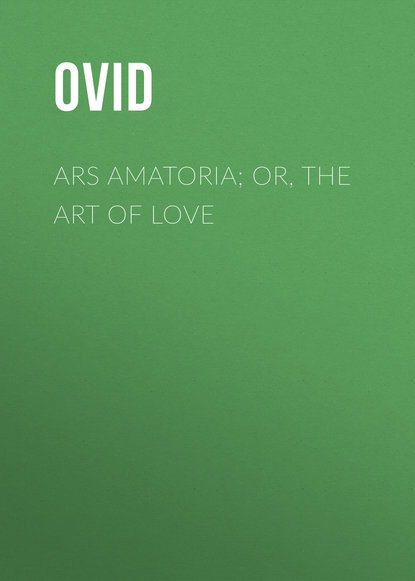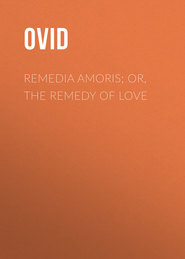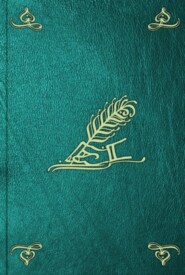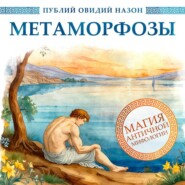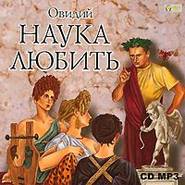По всем вопросам обращайтесь на: info@litportal.ru
(©) 2003-2024.
✖
Ars Amatoria; or, The Art Of Love
Настройки чтения
Размер шрифта
Высота строк
Поля
1064 (return (#x3_x_3_i25))
[ Poet of Cos.—Ver. 330. The poet Philetas. He flourished in the time of Philip and Alexander the Great. Anacreon was a lyric poet of Teios, and a great admirer of the juice of the grape.]
1065 (return (#x3_x_3_i25))
[ Or him, through whom.—Ver. 332. Some think that he means Menander, from whom Terence borrowed many of his scenes; he probably alludes to the Phormio of Terence, where the old men, Chremes and Demipho, are deceived by Geta, the cunning slave. See the Tristia, Book ii. 1. 359: and 69.]
1066 (return (#x3_x_3_i25))
[ Propertius.'—Ver. 333. See the Tristia, Book ii. 1. 465, and the Note.]
1067 (return (#x3_x_3_i25))
[ Tibullus.—Ver. 334. See the Amores, Book iii. EL ix.]
1068 (return (#x3_x_3_i25))
[ Varro.—Ver. 335. See the Pontic Epistles, Book iv. Ep. xvi. 1. 21; and the Amores, Book i. El. xv. 1. 21, and the Notes to the passages.]
1069 (return (#x3_x_3_i25))
[ Lofty Rome.—Ver. 338. He refers here to the Æneid of Virgil.]
1070 (return (#x3_x_3_i26))
[ Two sides.—Ver. 342. Both the males and the females.]
1071 (return (#x3_x_3_i26))
[ Composition.—Ver. 346. He takes to himself the credit of being the inventor of Epistolary composition.]
1072 (return (#x3_x_3_i27))
[ Masters of posture.—Ver. 351. These persons, who were also called 'ludii,' or 'histrlones,' required great suppleness of the sides, for the purpose of aptly assuming expressive attitudes; for which reason he calls them 'artifices lateris.' See the First Book, 1. 112; and the Tristia, Book ii, 1. 497, and the Note.]
1073 (return (#x3_x_3_i27))
[ Which she must call for.—Ver. 356. Probably at the game of 'duodecim seripta,' or 'twelve points,' like our backgammon; sets of three 'tesseræ,' or dice, were used for throwing; he recommends her to learn the game, and to know on what points to enter when taken up, and what throws to call for. See the last Book, 1. 203; and the Tristia, Book ii. 1. 473, and the Note.]
1074 (return (#x3_x_3_i27))
[ The pieces.—Ver. 357. See the Note to 1. 207, in the last Book.]
1075 (return (#x3_x_3_i27))
[ The warrior, too.—Ver. 359. He alludes to one of the principal pieces, whose fate depends upon another.]
1076 (return (#x3_x_3_i27))
[ Let the smooth balls.—Ver. 361. He seems to allude here to a game played by putting marbles (which seems to be the meaning of 'pilæ leves,' 'smooth balls,') into a net with the month open, and then taking them out one by one without moving any of the others.]
1077 (return (#x3_x_3_i27))
[ Kind of game.—Ver. 363. These two lines do not seem to be connected with the game mentioned in 1. 365, but rather to refer to that mentioned in 1. 355.]
1078 (return (#x3_x_3_i27))
[ A little table receives.}—Ver. 365. This game is mentioned in the Tristia, Book ii. 1. 481. It seems to resemble the simple game played by schoolboys on the slate, and known among them as tit-tat-to.]
1079 (return (#x3_x_3_i28))
[ No trusting.—Ver. 377. On account of the continued run of bad luck.]
1080 (return (#x3_x_3_i29))
[ Flying ball.'—Ver. 380. See the Tristia, Book ii. 1. 485-6, and the Note.]
1081 (return (#x3_x_3_i29))
[ The Virgin.—Ver. 385. This was near the Campus Martius. See the Fasti, Book i. 1. 464; and the Pontic Epistles, Book i. Ep. viii. 1. 38, and the Note.]
1082 (return (#x3_x_3_i29))
[ Etrurian.—Ver. 386. The Tiber flowed through ancient Etruria.]
1083 (return (#x3_x_3_i29))
[ The Virgin.—Ver. 388. He alludes to the heat while the sun is passing through the Constellation Virgo.]
1084 (return (#x3_x_3_i29))
[ Parætonium.—Ver. 390. See the Amores, Book ii. El. xiii. 1. 7, and the Note. He alludes to the victory of Augustus over Antony and Cleopatra, at Actium; on which the conqueror built the temple of Apollo on the Palatine hill.]
1085 (return (#x3_x_3_i29))
[ The suter and the wife.—Ver. 391. Livia, the wife, and Octavia, the sister of Augustus, are referred to.]
1086 (return (#x3_x_3_i29))
[ His son-in-law.—Ver. 392. The allusion is to M. Agrippa, the husband of Julia, the daughter of Augustus; after the defeat of the younger Pompey, Augustus presented him with a naval crown. A Portico built by Augustus was called by his name.]
1087 (return (#x3_x_3_i29))
[ Memphian heifer.—Ver. 393. See the Amores, Book i. El. viii. 1. 74.]
1088 (return (#x3_x_3_i29))
[ Frequent the three Theatres.—Ver. 394. He probably alludes to the theatres of Pompey, Balbus, and Marcellus, as they are mentioned by Suetonius as the 'trina theatra.']
[ Poet of Cos.—Ver. 330. The poet Philetas. He flourished in the time of Philip and Alexander the Great. Anacreon was a lyric poet of Teios, and a great admirer of the juice of the grape.]
1065 (return (#x3_x_3_i25))
[ Or him, through whom.—Ver. 332. Some think that he means Menander, from whom Terence borrowed many of his scenes; he probably alludes to the Phormio of Terence, where the old men, Chremes and Demipho, are deceived by Geta, the cunning slave. See the Tristia, Book ii. 1. 359: and 69.]
1066 (return (#x3_x_3_i25))
[ Propertius.'—Ver. 333. See the Tristia, Book ii. 1. 465, and the Note.]
1067 (return (#x3_x_3_i25))
[ Tibullus.—Ver. 334. See the Amores, Book iii. EL ix.]
1068 (return (#x3_x_3_i25))
[ Varro.—Ver. 335. See the Pontic Epistles, Book iv. Ep. xvi. 1. 21; and the Amores, Book i. El. xv. 1. 21, and the Notes to the passages.]
1069 (return (#x3_x_3_i25))
[ Lofty Rome.—Ver. 338. He refers here to the Æneid of Virgil.]
1070 (return (#x3_x_3_i26))
[ Two sides.—Ver. 342. Both the males and the females.]
1071 (return (#x3_x_3_i26))
[ Composition.—Ver. 346. He takes to himself the credit of being the inventor of Epistolary composition.]
1072 (return (#x3_x_3_i27))
[ Masters of posture.—Ver. 351. These persons, who were also called 'ludii,' or 'histrlones,' required great suppleness of the sides, for the purpose of aptly assuming expressive attitudes; for which reason he calls them 'artifices lateris.' See the First Book, 1. 112; and the Tristia, Book ii, 1. 497, and the Note.]
1073 (return (#x3_x_3_i27))
[ Which she must call for.—Ver. 356. Probably at the game of 'duodecim seripta,' or 'twelve points,' like our backgammon; sets of three 'tesseræ,' or dice, were used for throwing; he recommends her to learn the game, and to know on what points to enter when taken up, and what throws to call for. See the last Book, 1. 203; and the Tristia, Book ii. 1. 473, and the Note.]
1074 (return (#x3_x_3_i27))
[ The pieces.—Ver. 357. See the Note to 1. 207, in the last Book.]
1075 (return (#x3_x_3_i27))
[ The warrior, too.—Ver. 359. He alludes to one of the principal pieces, whose fate depends upon another.]
1076 (return (#x3_x_3_i27))
[ Let the smooth balls.—Ver. 361. He seems to allude here to a game played by putting marbles (which seems to be the meaning of 'pilæ leves,' 'smooth balls,') into a net with the month open, and then taking them out one by one without moving any of the others.]
1077 (return (#x3_x_3_i27))
[ Kind of game.—Ver. 363. These two lines do not seem to be connected with the game mentioned in 1. 365, but rather to refer to that mentioned in 1. 355.]
1078 (return (#x3_x_3_i27))
[ A little table receives.}—Ver. 365. This game is mentioned in the Tristia, Book ii. 1. 481. It seems to resemble the simple game played by schoolboys on the slate, and known among them as tit-tat-to.]
1079 (return (#x3_x_3_i28))
[ No trusting.—Ver. 377. On account of the continued run of bad luck.]
1080 (return (#x3_x_3_i29))
[ Flying ball.'—Ver. 380. See the Tristia, Book ii. 1. 485-6, and the Note.]
1081 (return (#x3_x_3_i29))
[ The Virgin.—Ver. 385. This was near the Campus Martius. See the Fasti, Book i. 1. 464; and the Pontic Epistles, Book i. Ep. viii. 1. 38, and the Note.]
1082 (return (#x3_x_3_i29))
[ Etrurian.—Ver. 386. The Tiber flowed through ancient Etruria.]
1083 (return (#x3_x_3_i29))
[ The Virgin.—Ver. 388. He alludes to the heat while the sun is passing through the Constellation Virgo.]
1084 (return (#x3_x_3_i29))
[ Parætonium.—Ver. 390. See the Amores, Book ii. El. xiii. 1. 7, and the Note. He alludes to the victory of Augustus over Antony and Cleopatra, at Actium; on which the conqueror built the temple of Apollo on the Palatine hill.]
1085 (return (#x3_x_3_i29))
[ The suter and the wife.—Ver. 391. Livia, the wife, and Octavia, the sister of Augustus, are referred to.]
1086 (return (#x3_x_3_i29))
[ His son-in-law.—Ver. 392. The allusion is to M. Agrippa, the husband of Julia, the daughter of Augustus; after the defeat of the younger Pompey, Augustus presented him with a naval crown. A Portico built by Augustus was called by his name.]
1087 (return (#x3_x_3_i29))
[ Memphian heifer.—Ver. 393. See the Amores, Book i. El. viii. 1. 74.]
1088 (return (#x3_x_3_i29))
[ Frequent the three Theatres.—Ver. 394. He probably alludes to the theatres of Pompey, Balbus, and Marcellus, as they are mentioned by Suetonius as the 'trina theatra.']





